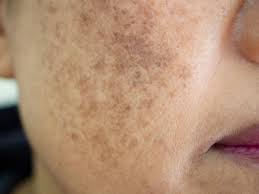Diseases

Skin Hyper Pigmentation
Ayurveda offers various approaches to manage dark pigmentation of the skin by addressing the underlying imbalances, promoting skin health, and enhancing overall well-being. Dark pigmentation can be caused by factors such as excess melanin production, sun exposure, hormonal changes, and certain skin conditions. Here are some key aspects of Ayurvedic management for dark pigmentation:
1. Identifying the Underlying Causes: Ayurvedic practitioners assess an individual's dosha (constitution), overall health, and lifestyle to identify the root causes of dark pigmentation. Treatment is tailored to address these specific causes, which may include imbalances in Pitta dosha, sun damage, or hormonal factors.
2. Herbal Remedies: Ayurvedic herbs and formulations are used to support skin health and address dark pigmentation. Some commonly used herbs include Turmeric, Aloe Vera, Neem, Manjistha, and Sandalwood. These herbs have antioxidant, anti-inflammatory, and skin-lightening properties that can help reduce pigmentation and promote an even skin tone.
3. Diet and Nutrition: Ayurvedic dietary recommendations for skin health focus on consuming foods that support detoxification, liver health, and skin rejuvenation. This includes incorporating fresh fruits, vegetables, whole grains, lean proteins, and healthy fats into the diet. Drinking plenty of water and avoiding excessive caffeine and alcohol are also advised.
4. Skin Care Practices: Ayurveda emphasizes proper skincare practices to manage dark pigmentation. This includes gentle cleansing, exfoliation using natural ingredients like chickpea flour or oatmeal, and regular moisturization with natural oils or herbal preparations. Protection from excessive sun exposure is crucial to prevent further darkening of the skin.
5. Lifestyle Modifications: Ayurveda recognizes the impact of lifestyle choices on skin health. Managing stress through techniques such as meditation and yoga, getting adequate sleep, and avoiding excessive alcohol and tobacco use can contribute to healthier skin.
6. External Therapies: Ayurvedic therapies such as Ubtan (herbal paste application), Abhyanga (therapeutic massage), and Mukhalepa (facial masks) can be beneficial for improving skin health, reducing pigmentation, and promoting an even skin tone.
7. Avoidance of Chemical-based Products: Ayurveda promotes the use of natural and herbal skincare products and advises against the use of chemical-based cosmetics that may further irritate or damage the skin.
It's important to consult with a qualified Ayurvedic practitioner or dermatologist for a proper diagnosis, personalized treatment plan, and guidance throughout the course of treatment. Ayurvedic treatments can be used alongside conventional skincare approaches, and it's important to inform all healthcare providers about the treatments you are undergoing. Regular monitoring of skin condition and follow-up with healthcare professionals are essential for managing dark pigmentation effectively.
